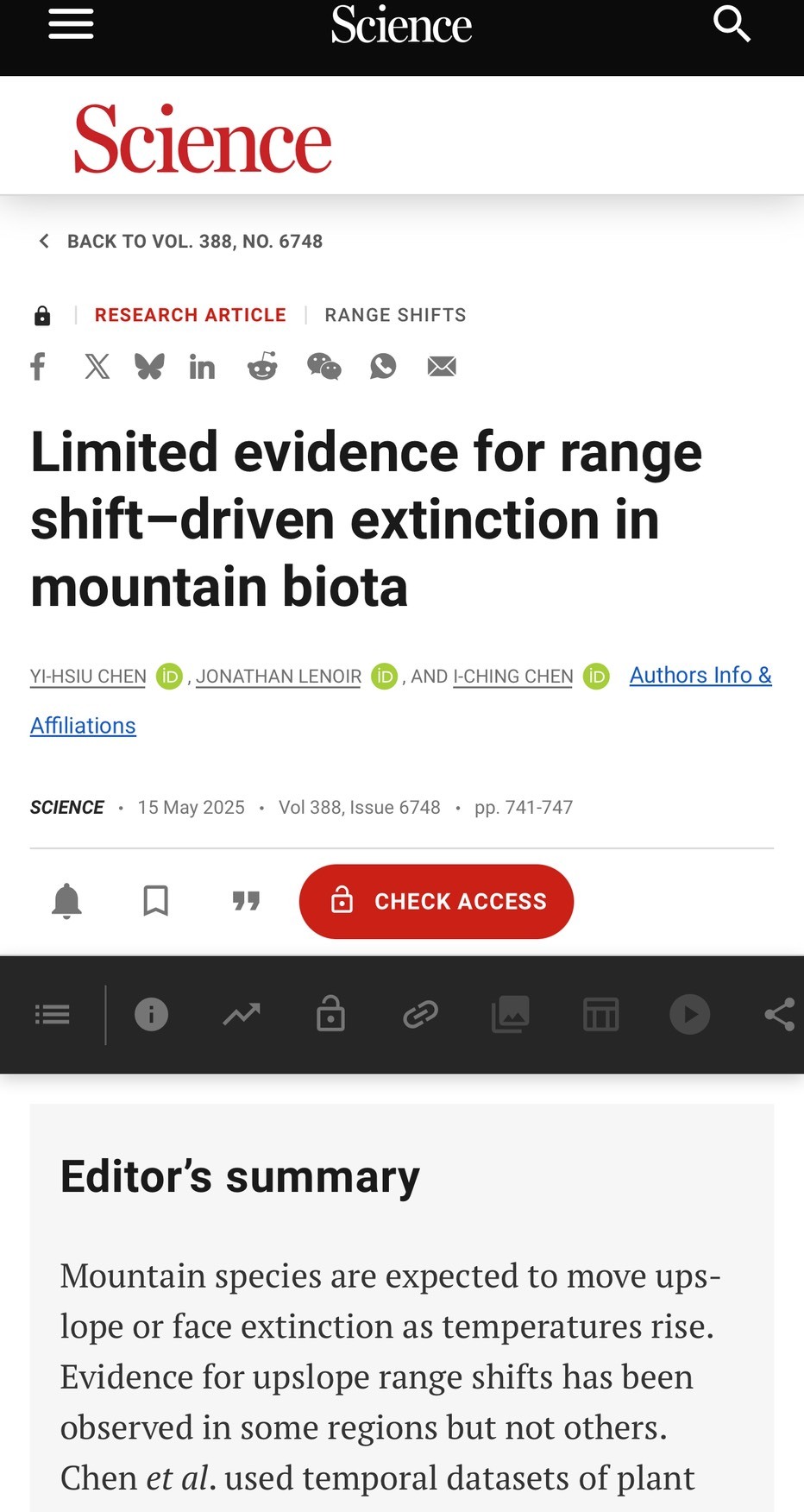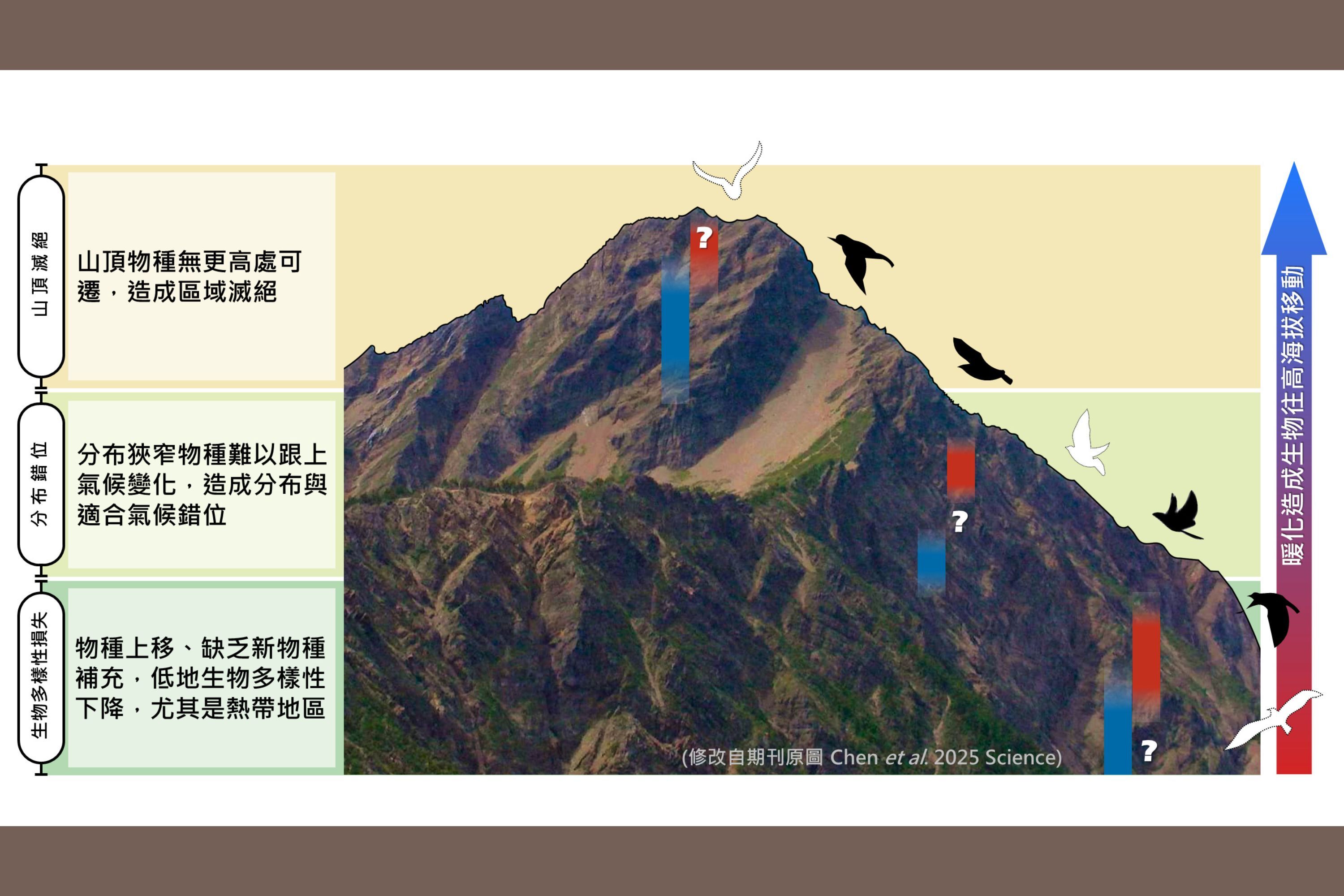Taiwan-Led Study in Science Challenges the 'Extinction Escalator' Hypothesis under Climate Warming
Written by NCKU News Center. Image credit to I-Ching Chen.
As global temperatures rise, scientists have long warned that mountain species may be on an “extinction escalator”—pushed uphill by warming until they run out of space. A new study led by Professor I-Ching Chen at National Cheng Kung University (NCKU), Taiwan, offers the most comprehensive test of this hypothesis to date and finds the evidence far weaker than previously assumed. Published in Science on May 16, the study provides a new perspective on how species are responding to climate change.
Limited evidence for range shift–driven extinction in mountain biota
Limited evidence for range shift–driven extinction in mountain biota

A new study led by Professor I-Ching Chen at National Cheng Kung University (NCKU), Taiwan, offers the most comprehensive test of this hypothesis to date and finds the evidence far weaker than previously assumed. Published in Science on May 16, the study provides a new perspective on how species are responding to climate change.

The “extinction escalator” hypothesis suggests that climate change poses three major risks to mountain biodiversity (adapted from the original journal article)
The study shows that while many species have moved upslope in response to warming, summit species have largely maintained their elevational ranges, demonstrating surprising resilience rather than the expected range collapse. Meanwhile, narrow-ranged and low-elevation species—particularly birds—have expanded their ranges upslope. This has led to increased species overlap and homogenized community composition along elevational gradients.

Accelerated warming in Taiwan places increasing pressure on mountain ecosystems_Photo credit_Yushan National Park Headquarters_Taiwan

Professor I-Ching Chen (right) and postdoctoral researcher Dr. Yi-Hsiu Chen (left) from NCKU used global data to rigorously test the “extinction escalator” hypothesis for the first time.
“Mountains are global biodiversity hotspots that are especially vulnerable to climate change,” said Dr. Yi-Hsiu Chen, first author of the study. “We set out to rigorously test the ‘escalator to extinction’ hypothesis, which predicts that summit species may go extinct with no higher ground to move to, narrow-ranged species may fail to track shifting climates, and lowland communities may lose biodiversity without species replenishment. What we found is that biological responses are far more complex.”

Accelerated warming in Taiwan places increasing pressure on mountain ecosystems_Photo credit_ Ching Yao Chiu
The team compiled 8,800 data points documenting historical and modern elevational ranges of 440 animal and 1,629 plant species across 23 mountain regions worldwide—some datasets spanning a full century. They applied two advanced Bayesian multivariate models to analyze shifts in species’ upper and lower elevation limits, elevational midpoints, and range sizes. By fully accounting for geographic constraints and statistical noise in mountain systems, the study achieves a level of resolution not previously possible.

Taiwan’s endemic Formosan Flat butterfly is expanding its elevational range_Photo credit_Wen Jie Lin_Yushan National Park Headquarters_Taiwan
Co-author Dr. Jonathan Lenoir cautions that the situation is not risk-free, as delayed biological responses will accumulate an "extinction debt" that may significantly impact biodiversity in the future. For example, the delayed migration of plant communities observed in European mountains suggests that high-elevation ecosystems may currently be in a temporarily stable transition period that will eventually face change.

Taiwan’s alpine accentor may be experiencing greater competition from other birds expanding into high-elevation areas_Jia Sheng Chen_Yushan National Park Headquarters_Taiwan
Professor I-Ching Chen pointed out that the expansion of many species' distributions suggests that climate niches in many mountain regions are not fully occupied, possibly due to constraints from biological interactions or other factors. Climate warming is altering these constraints, highlighting the need to better understand how species interactions shape climate adaptation. From a conservation perspective, mitigating climate warming remains the most fundamental approach, while preserving natural habitats and spatial connectivity ensures species can migrate and adapt to rapidly changing climate conditions.

The endemic Formosan Yellow-throated Marten has become more frequently visible in Taiwan’s mountain regions_Photo credit_Yushan National Park Headquarters_Taiwan
Provider:
NCKU News Center
Date:
2025-05-16




